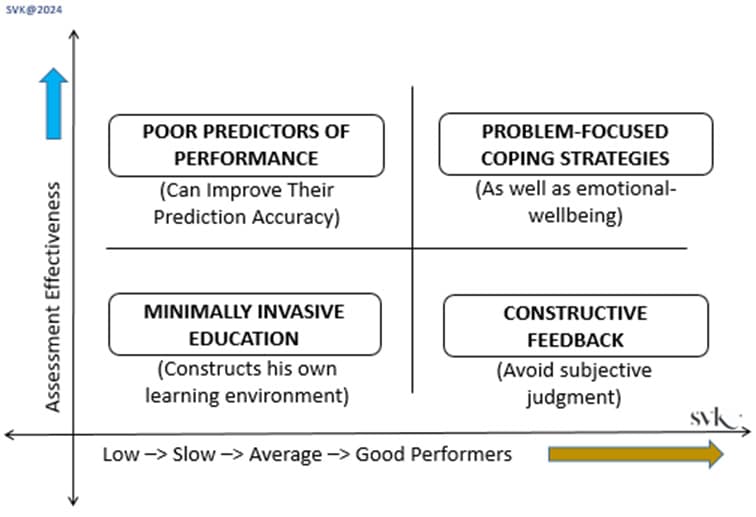Background – In continuation to my address in Without the Fear of Assessment in LEAD THE CHANGE: AN ANTHOLOGY TO EMPOWER SCHOOL LEADERS (2019) I believe that your feedback even on a dress or drawing matters the very feeling of a job well done. The mood and moment, the tenacity of the situation and the humility package validity decide the outcome of the effort / exercise being assessed. We have learnt to give a positive feedback as far as possible. Many evaluators agree to the fact to be transparent in their feedback.
Significance – The critics in any form viz. teachers, parents, or peers may need to consider using the following themselves or in combination with alternative assessment strategies to substantiate the cognizant learning. The strategies namely, soundness of the assessment methodology, documentary collection of assignments, the problematic technique employed and the psychometric evaluation variance. The effectiveness of the evaluators towards the student development gets defeated on many occasions.
Under such circumstances, an angle of conscious human behaviour is presented in Fig-1 taking a cross-section between the Assessment Effectiveness and Level of Performers.
Interpretation – A Matrix between Hospitality Education and Industry sync, illustrated.
- MINIMALLY INVASIVE EDUCATION
The primary learning into a preferred or a new field of study/ skill / work. Here the person tries to get the minimal information of everything in a small package. Education in a certain subject enables people to think, feel, and behave in ways that contribute to their success and increase not only their own pleasure but also the community. Furthermore, education helps to shape people’s personalities, thoughts, and interactions with others, as well as prepare them for life experiences. - POOR PREDICTORS OF PERFORMANCE
The low to average performers take the assessment with a pinch of salt. Internalizing the negative news that they are underperforming helps them focus on what they can do to improve in the future. Input-based relative performance feedback gradually raises poor performers’ contribution accuracy. - CORRECTIVE FEEDBACK
The feedback should be corrective for good for improvement and for extending a leap more. The teachers have to adapt to acknowledge the influence of their students’ beliefs, the appropriate types of feedback, and the interaction between contextual factors, learner factors, facilitator types and positivity of negative recordings and avoid subjective judgement. - PROBLEM FOCUSSED COPING STRATEGIES
Competition and peer lead to academic stress. If students can cope effectively with academic stress, then can enjoy their college life. Students who employ emotion-focused coping techniques especially the examination period cope better with stress than those who utilize problem-focused solutions. It is necessary to transform the institutional mind set towards a safe learning environment to improve the educational process to ensure the socio-emotional wellbeing of students.
Intention – In education for over two decades my submission is to be open to the fear factor and equip the students with the basic understanding of the matter in question, thereby the retrospective reflex. This by imbibing a positive-negative-positive style of feedback (sandwich, you have all the liberty to increase the layers and filling in them); applicable are both post-session feedback and During-session feedback. Studies have proven that within the session feedback produce the highest implementation fidelity during the initial role play in students to feel confident to appear assessments without fear.
Written by Dr. Salla Vijay Kumar.
Have you read?
5 Reasons You Should Invest in Fashion Tech in 2024.
10 Strategies to Limitless Leadership.
What’s LOVE got to do with Business? Everything!
This One Insurance Hack Saves Your Business from Disaster.
Wisdom and Transformation: The Story of Dan Jahn.
Add CEOWORLD magazine to your Google News feed.
Follow CEOWORLD magazine headlines on: Google News, LinkedIn, Twitter, and Facebook.
This report/news/ranking/statistics has been prepared only for general guidance on matters of interest and does not constitute professional advice. You should not act upon the information contained in this publication without obtaining specific professional advice. No representation or warranty (express or implied) is given as to the accuracy or completeness of the information contained in this publication, and, to the extent permitted by law, CEOWORLD magazine does not accept or assume any liability, responsibility or duty of care for any consequences of you or anyone
else acting, or refraining to act, in reliance on the information contained in this publication or for any decision based on it.
Copyright 2024 The CEOWORLD magazine. All rights reserved. This material (and any extract from it) must not be copied, redistributed or placed on any website, without CEOWORLD magazine’ prior written consent. For media queries, please contact: info@ceoworld.biz
SUBSCRIBE NEWSLETTER

























































![Social Media Spring Cleaning [Infographic] Social Media Spring Cleaning [Infographic]](https://imgproxy.divecdn.com/9e7sW3TubFHM00yvXe5zvvbhAVriJiGqS8xmVFLPC6s/g:ce/rs:fit:770:435/Z3M6Ly9kaXZlc2l0ZS1zdG9yYWdlL2RpdmVpbWFnZS9zb2NpYWxfc3ByaW5nX2NsZWFuaW5nMi5wbmc=.webp)
![5 Ways to Improve Your LinkedIn Marketing Efforts in 2025 [Infographic] 5 Ways to Improve Your LinkedIn Marketing Efforts in 2025 [Infographic]](https://imgproxy.divecdn.com/Hv-m77iIkXSAtB3IEwA3XAuouMwkZApIeDGDnLy5Yhs/g:ce/rs:fit:770:435/Z3M6Ly9kaXZlc2l0ZS1zdG9yYWdlL2RpdmVpbWFnZS9saW5rZWRpbl9zdHJhdGVneV9pbmZvMi5wbmc=.webp)














